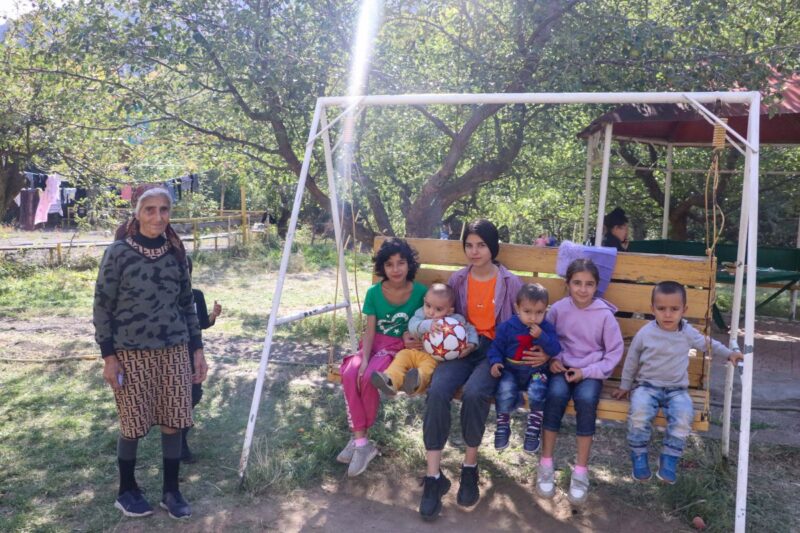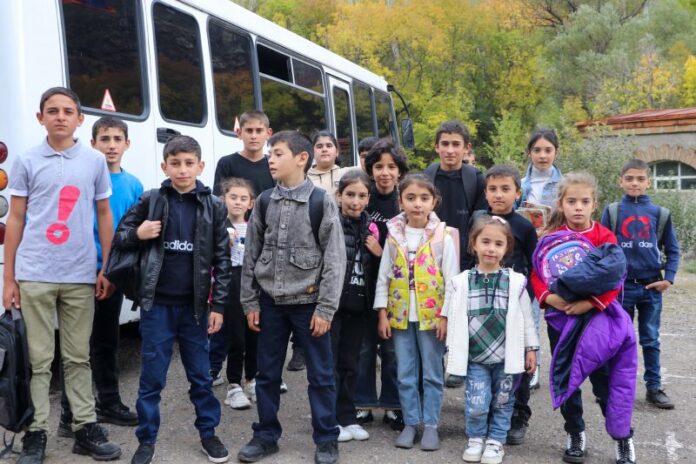BERLIN — Humanitarian aid continues to flow from generous German organizations into Armenia, to help alleviate the suffering of those among the 100,000 people forced to flee their homes in Artsakh. Among them is the Berlin-based human rights organization, Against Genocide, for International Understanding (AGA), which raised $28,000 to support a vital initiative launched by the church.

The Diocese of the Armenian Apostolic Church in Vayots Dzor has opened a camp for Armenian refugees coming from Artsakh. The Siranoush Camp was originally a summer camp for youth. At the end of September of this year, on the heels of the Azerbaijan aggression which forced the expulsion of Artsakh Armenians, it was transformed into a facility to provide them, both young and old, with housing. As project director Harutyun Harutyunyan reported in an interview he gave in November, already in the first weeks 175 people had arrived in search of permanent lodgings, while another 100 or so stayed only for a short time. Not long thereafter the situation fluctuated, as some families found places to rent with government financial help, settling in villages where they could also seek employment.
In early November 11 large families lived at the camp, some with members requiring special care. At the time of his interview, Harutyunyan said there were 45 residents, 18 of them children. However, with visits by relatives and former residents who might stay for several days, the camp found it was dealing with daily needs of up to 200 people. By that time, so many more refugees had entered Armenia that state-controlled facilities, like hotels, had been filled, and this camp continued to receive calls and visits from people seeking refuge. Many will stay for a year or more, until they can relocate to more permanent locations. All those residing at the camp receive social as well as legal and psychological support, provided by the camp’s staff, volunteers, and state organizations. The funds donated by AGA have also financed the purchase of new warm clothing, for the cold winter months. Now project director Harutyunyan stresses the need for a generator to provide energy for heating; since the facility was formerly a summer camp, there is no central heating available, and alternative means are either insufficient to heat the very large buildings or prohibitively expensive. The buildings themselves are old and would need renovation.
Most important is the employment possibilities that the contributions from Germany have made possible. The camp can provide salaries for required personnel, a coordinator for the youth, teachers for elementary and high school children as well as helpers, a cook, assistant cook, and kitchen help, a nurse, custodian, laundry woman, and a bus driver for travel to and from school, as well as Sunday outings. Most of these jobs have gone to Artsakh Armenians, which means they have become gainfully employed by the Syunik Development NGO and integrated into the local labor force.
This has not only had a beneficial effect financially, but also, Harutyunyan explained, provides help in overcoming trauma and starting a new work experience in the community. And for the children, obviously, it is enormously important to continue their education. The bus takes them to school in the village of Hermon as well as Yeghegis, which together provide instruction for all grades. The camp itself has a kindergarten, which serves the needs not only of the children from Artsakh, but also of children from the nearby villages, which lack such a pre-school institution.
The camp personnel provide assistance even outside the camp itself, visiting many of the 2,100 Artsakh refugees registered in the Vayots Dzor region, who need food, medicine, study aids and even wood for fuel. Harutyunyan mentioned the need in the next phase of activity to pay special attention to psychological support, since the refugees have obviously suffered significant difficulties arising from their traumatic experience. Not only the dramatic expulsion and trek to Armenia itself, but the 9 months of blockade that preceded it took an enormous toll on the psychological well-being of the population.








